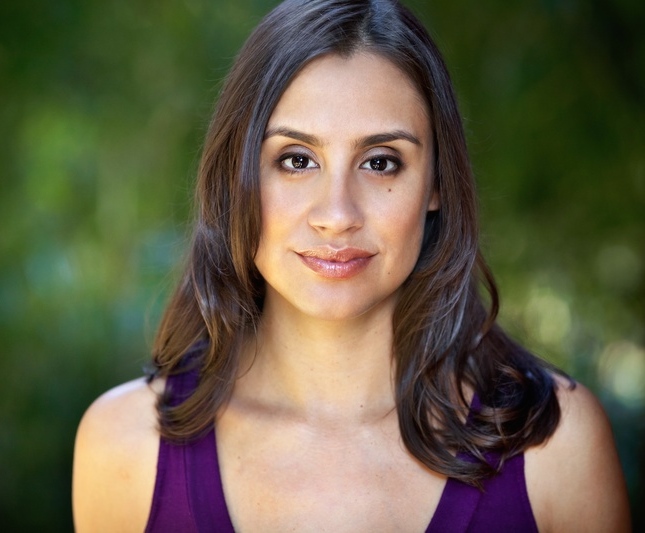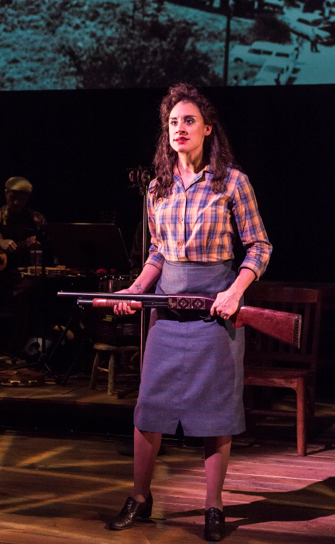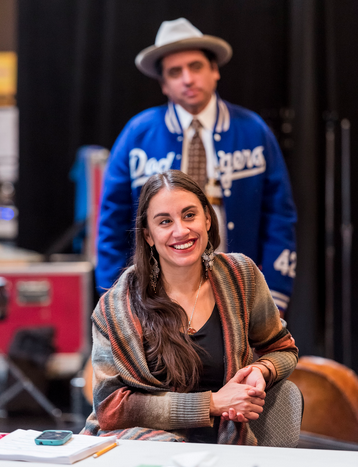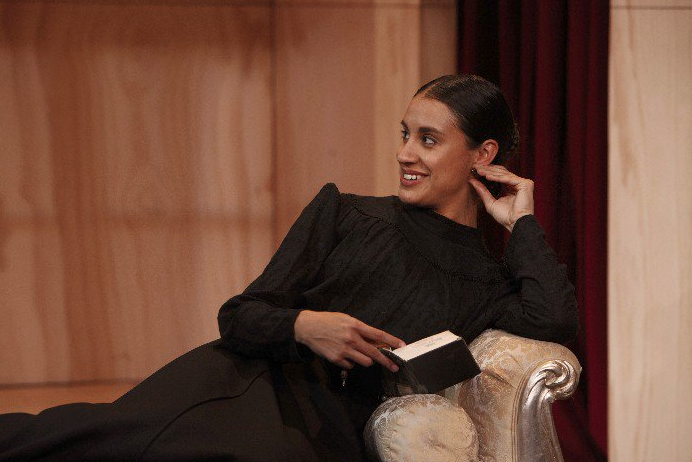USC Alumna Sabina Zuniga Varela Shares Her Personal Story And Her Role In 'Chavez Ravine'

READ THE REVIEW: The Untold Story Of Dodger Stadium: 'Chavez Ravine' At The KDT
“Chavez Ravine,” now playing at the Kirk Douglas Theatre through March 1, is a refreshing mix of political satire, social activism, and vaudevillian comedy. Traveling through time in East Los Angeles, “Chavez Ravine” tells the forgotten story of an entire Latino community that was uprooted from their homes for what was initially going to be a low-income housing project, but what would ultimately dissolve into the construction of Dodger Stadium.
Sabina Zuniga Varela portrays a multitude of characters throughout the show, but her most memorable character is that of Maria, the young, fiery activist at the forefront of the fight to save Chavez Ravine. Sabina shared with Neon Tommy how the character of Maria hit especially close to home:
“It starts with my parents. My mom was a civil rights activist, she worked for the Student Nonviolent Coordinating Committee down in Selma and other parts of Mississippi and Alabama, back in the 1960s. She worked for voting rights, and she also was a photographer who just saw some really incredible stuff down there, and was really right in the heart of it…she’s now a professor, she teaches on student movements and where they are now, what’s happening, what’s the difference, what can generationally be passed on to help continue the power that the movements had back then."

The daughter of a civil rights activist and a Vietnam veteran, Sabina was exposed to political activism at a young age:
“When I grew up, I was instilled with this sense of service, a sense of community, and how important it was to work for and give back to the community. From a very early age, I was working in the offices my mom worked at, I traveled with her a lot, and I was surrounded by all these adults doing some really cool things. She’s a MacArthur award winner, and she got that honor back in 1990, so when I was little, I would travel with her to the reunions and meet all these other amazing people who were doing all this incredible work but weren’t very well-known.”
One of the most fascinating aspects of “Chavez Ravine” is the fact that it is a truly forgotten moment in L.A. history that a majority of Angelino's are unaware of. Sabina added, “I was also not aware of this story beforehand, but there’s still a group called Los Desterrados, “The Uprooted,” and the history of L.A. is so full of culture, and forgotten stories, a history founded by blacks and latinos."
In addition to her passion for acting, Sabina is equally as passionate about her teaching.
“I love teaching, absolutely love teaching. And I did a lot of outreach, I did a lot of poetry classes, and youth organizing. My undergraduate degree was in liberal arts where I did a little bit of everything and I could pick and choose what classes to take from all departments, and I was taking seminar classes and one of them was on service learning where I learned a lot about the work of different movements and how teaching and theater could be used as tools to help people find their voice.”
“I had so much fun introducing theater to these kids, and watching kids who were otherwise quiet or shy or maybe had a learning disability, really embrace storytelling. And be able to get up in front of their peers and speak and share their own stories, and develop all these skills, people skills and a sense of self-confidence, that they may not have been able to develop otherwise… So I thought, if they’re going to take all of the arts out of schools and push for standardized teaching, there’s got to be a way for teachers to use theater in the classroom within all the requirements.”
As an educator, Sabina has been dedicated to re-integrating theater and the arts into the public school curriculum, despite the legislative and bureaucratic obstacles that have been put in place to minimize and often eliminate arts education.

Sabina went on to acknowledge the great work the Kirk Douglas Theatre has done in terms of youth audience outreach to expose students to theater. This has been particularly true with “Chavez Ravine,” which held a number of weekday matinees to accommodate the schedules of students and encourage schools to take field trips to see the show.
“We’ve had entire high school classes come to our performances and matinees during the week so that schools could take field trips to see the show. I think that’s awesome, I think that’s great… I’m actually really impressed with the Kirk Douglas [Theatre] in particular with their audience outreach and development programs. The other night, they had a young professionals event which aimed specifically at targeting a lower age audience. Because youth isn’t just kids and teenagers, youth includes younger professionals who are going to be making big decisions in the near future that will likely affect the arts.”
Another interesting aspect of “Chavez Ravine” and the work of Culture Clash, is their use of comedy to convey tragedy. While there are glimpses of troubling reality here and there, the show is overwhelmingly hilarious as each of the characters pokes fun at the political establishment and plays into the caricatures of notable figures in history such as LA MAYOR and even J. Edgar Hoover. Sabina explains the use of comedy as a tool in “Chavez Ravine”:
“Generations and generations of people who have been oppressed have found their storytelling through comedy… Comedy is a form of propaganda, but it’s really difficult to do because you’re trying to get this message across of ‘Hey, wake up!’ but remain clever and biting at the same time… and I think what it does is, it provides people with a chance to commiserate together on things that are going wrong, but also band together through laughter. Laughter is a very interesting medicine which can help you get through things that are difficult and it can also give you a sense of hope. It also adds a sharpness to the performance that is just a beautiful thing to watch when it’s executed well.”
Sabina is a graduate of USC’s MFA Acting program, and shared her experiences in the program and how they helped her grow into a really strong actor and even stronger person.

“It was a huge life change, I had to pick up and move away from my family, away from my school, and come to USC. It was 3 of the hardest years of my life, it really forced me to reexamine myself as a human being and as an artist. I graduated in 2011, and since then I’ve been doing regional theater and moving around, but for now I’m back in L.A.”
SEE ALSO: Varied & Vibrant: Meet USC's MFA Acting Class of 2015
Sabina ends with a few words of wisdom for those soon-to-be graduates about to dive into their own artistic journeys:
“Don’t put so much pressure on trying to find the ‘ideal career’… don’t freak out and jump into something because you feel you have to be successful all of the sudden, but really let your passions lead you. And start a savings account! [Laughs] But seriously, it’s always a good idea to start putting some money away because as an artist you never know when your next job is, so be smart with your money and have a small savings that can float you so you can have the ability to follow through on your passions and not have to get tied down.”
A talented artist, a intelligent mind, and a beautiful human being, it is no wonder Sabina Zuniga Varela is able to bring such depth to the roles she plays in “Chavez Ravine.”
"Chavez Ravine: An L.A. Revival" is playing at the Kirk Douglas Theatre (9820 Washington Blvd., Culver City) through March 1. Tickets are $25-$65. For more information visit CenterTheatreGroup.org
Contact Theater Editor Savannah L. Barker here.
For more Theater & Dance coverage, click here.



